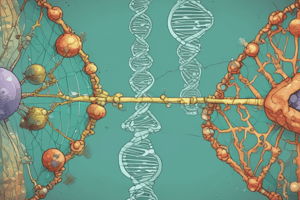Podcast
Questions and Answers
What is the primary mechanism driving evolution?
What is the primary mechanism driving evolution?
- Genetic drift
- Mutation rate
- Gene flow
- Natural selection (correct)
Which of the following is a crucial aspect for the survival of species?
Which of the following is a crucial aspect for the survival of species?
- Genetic variation
- Population size
- Immigration
- Adaptation (correct)
Which component is essential for maintaining healthy ecosystems?
Which component is essential for maintaining healthy ecosystems?
- Deforestation
- Overpopulation
- Biodiversity (correct)
- Monoculture
What step is involved in testing hypotheses in biology?
What step is involved in testing hypotheses in biology?
Why is understanding biology important for addressing global issues?
Why is understanding biology important for addressing global issues?
What is the fundamental unit of life?
What is the fundamental unit of life?
Which branch of biology focuses on heredity and variation in organisms?
Which branch of biology focuses on heredity and variation in organisms?
What does the process of evolution primarily involve?
What does the process of evolution primarily involve?
What is the study of interactions between organisms and their environment called?
What is the study of interactions between organisms and their environment called?
Which structure is found in eukaryotic cells but not in prokaryotic cells?
Which structure is found in eukaryotic cells but not in prokaryotic cells?
What is the primary role of DNA in living organisms?
What is the primary role of DNA in living organisms?
Which of the following is NOT considered a branch of biology?
Which of the following is NOT considered a branch of biology?
Which biological process occurs in cells to convert sunlight into energy?
Which biological process occurs in cells to convert sunlight into energy?
Flashcards
Biology
Biology
The scientific study of living things, including their structure, function, growth, origin, evolution, and distribution.
Cell
Cell
The basic unit of life, exhibiting diverse structures and functions.
Genetics
Genetics
The study of heredity and how traits are passed from one generation to the next.
Evolution
Evolution
Signup and view all the flashcards
Ecology
Ecology
Signup and view all the flashcards
Homeostasis
Homeostasis
Signup and view all the flashcards
DNA
DNA
Signup and view all the flashcards
RNA
RNA
Signup and view all the flashcards
Protein Function
Protein Function
Signup and view all the flashcards
Enzyme Role
Enzyme Role
Signup and view all the flashcards
Natural Selection
Natural Selection
Signup and view all the flashcards
Ecosystem Parts
Ecosystem Parts
Signup and view all the flashcards
Data Analysis
Data Analysis
Signup and view all the flashcards
Study Notes
Introduction to Biology
- Biology is the scientific study of life, encompassing a vast diversity of organisms.
- It explores the structure, function, growth, origin, evolution, and distribution of living things.
- Biology studies life's processes at various scales, from molecules to ecosystems.
Key Concepts in Biology
- Cells: The fundamental unit of life. All living organisms are composed of cells, which exhibit a wide range of structures and functions.
- Genetics: The study of heredity and variation in organisms. This involves the transmission of traits from one generation to the next through genes and DNA.
- Evolution: The process by which populations of organisms change over time through natural selection. It results in the diversity of life we see today.
- Ecology: The study of interactions between organisms and their environment. It encompasses numerous levels, from individuals to ecosystems.
- Homeostasis: The maintenance of a stable internal environment within an organism, despite external changes.
Branches of Biology
- Botany: The study of plants.
- Zoology: The study of animals.
- Microbiology: The study of microscopic organisms like bacteria, viruses, and fungi.
- Genetics: Focuses on heredity and variation in organisms, including the structure and function of DNA.
- Physiology: Studies the functions of living organisms and their parts.
- Molecular Biology: Examines biological processes at the molecular level.
- Biochemistry: Explores the chemical processes occurring in living organisms.
- Immunology: Studies the body's immune system, its response to pathogens, and its role in health and disease.
- Ecology: Examines the interactions between organisms and their environment, considering factors like population dynamics, community structure, and energy flow.
- Evolutionary Biology: Investigates the processes that have shaped the diversity of life over time, spanning from phylogenetic relationships to adaptation and speciation.
Cellular Biology
- Cells are the building blocks of life, exhibit diverse structures and functions.
- Cell membranes regulate the movement of substances in and out.
- Eukaryotic cells contain membrane-bound organelles, unlike prokaryotic cells.
- Cellular processes include respiration, photosynthesis, and protein synthesis.
Molecular Biology
- DNA is the fundamental unit of genetic information.
- RNA plays various roles in protein synthesis.
- Proteins are essential for diverse cellular functions.
- Enzymes are biological catalysts.
Evolutionary Biology
- Species change over time.
- Natural selection is a primary mechanism driving evolution.
- Adaptation is crucial for species survival.
- Common ancestry explains the relationships between different organisms.
Ecology
- Ecosystems consist of living organisms and their environment.
- Energy flows and nutrients cycle within ecosystems.
- Population dynamics and community interactions are essential components.
- Biodiversity is an important aspect of healthy ecosystems.
Methods in Biology
- Observation: Gathering data about natural phenomena.
- Experimentation: Testing hypotheses about biological events.
- Data analysis: Drawing conclusions based on experimental findings.
- Modeling: Creating simplified representations of biological systems.
Importance of Biology
- Understanding the natural world.
- Developing new medicines and treatments.
- Addressing global issues like climate change and food security.
- Preserving biodiversity.
- Improving human health.
Studying That Suits You
Use AI to generate personalized quizzes and flashcards to suit your learning preferences.




